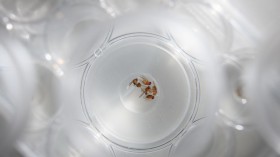A songbird species known as Bicknell's Thrush (Catharus bicknelli) only breeds among spruce-fir forests, which will probably move further north to seek cool temperatures as the climate changes. Because of this, researchers believe the species is severely threatened by their decreasing range and increased competition from related birds downslope.
Also, in a recent study led by Cornell University, researchers learned that following spruce-fir forests is not the only thing driving these birds uphill: Researchers say competition with their cousins -- Swainson's Thrushes (Catharus ustulatus) -- could escalate their climb, according to a news release.
Using songbird recordings of both species and playback experiments, researchers were able to test their reactions, such as how quickly they approached the speaker and how much they vocalized in response. In doing so they found Swainson's Thrushes approached a speaker in response to recorded Bicknell's Thrush songs in nine out of 36 trials. However, Bicknell's Thrush approached the speaker in response to a Swainson's Thrush recording in only 1 out of 16 trials. This suggests Swainson's Thrushes are behaviorally dominant over Bicknell's Thrushes and more likely to be aggressive toward them. It follows then that a warming climate could allow Swainson's Thrushes -- those bullies -- to move farther upslope and compete with vulnerable Bicknell's Thrushes, researchers say.
When first setting out to study Bicknell's Thrushes, researchers were worried it would be difficult to find them hidden in such a limited high-altitude range.
"This, of course, would have deep-sixed the project, as you can't study a bird you can't find," Benjamin Freeman, lead author from Cornell University, said in the release, adding that he had never actually seen a Bicknell's Thrush before. "But when we reached the ridgetop at dawn on our first day, we almost immediately heard a Bicknell's Thrush singing -- then a second and a third! We were elated, and even the clouds of blackflies couldn't ruin the day."
Although the aggressiveness of Swainson's Thrushes toward Bicknell's Thrushes has been noted before, researchers lacked the quantitative evidence to support their beliefs.
"If Swainson's Thrushes are more aggressive, as this study suggests, we may have to consider intraspecific behavior as part of a Bicknell's Thrush conservation action plan in the future," Kent McFarland of the Vermont Center for Ecostudies explained in the release.
Their findings were recently published in The Condor: Ornithological Applications.
Related Articles
Researchers Plan To Use Stem Cells To Rescue Northern White Rhinos
Volcano Meets Rare Frog; Ecuador Campaigns to Save Frog
For more great nature science stories and general news, pleasevisit our sister site, Headlines and Global News (HNGN).
-Follow Samantha on Twitter @Sam_Ashley13
© 2024 NatureWorldNews.com All rights reserved. Do not reproduce without permission.





